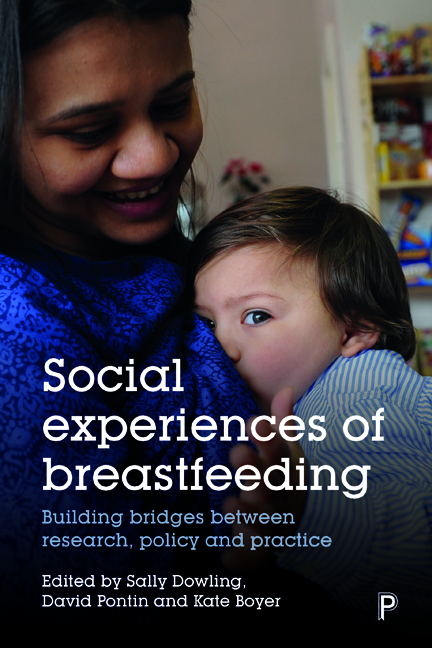Book contents
- Frontmatter
- Dedication
- Contents
- List of tables and figures
- Notes on contributors
- Acknowledgements
- Introduction
- The UK policy context: reconfiguration of the Unicef UK Baby Friendly Initiative to reflect the importance of relationships and ensuring sustainability
- Part I Breastfeeding and emotions
- Part II Cultures of breastfeeding
- Part III Breastfeeding and popular culture
- Conclusion
- Appendix: Schedule for ESRC Seminar Series: Social Experiences of Breastfeeding: Building bridges between research and policy, 2015–16
- Index
five - ‘Missing milk’: an exploration of migrant mothers’ experiences of infant feeding in the UK
Published online by Cambridge University Press: 22 April 2022
- Frontmatter
- Dedication
- Contents
- List of tables and figures
- Notes on contributors
- Acknowledgements
- Introduction
- The UK policy context: reconfiguration of the Unicef UK Baby Friendly Initiative to reflect the importance of relationships and ensuring sustainability
- Part I Breastfeeding and emotions
- Part II Cultures of breastfeeding
- Part III Breastfeeding and popular culture
- Conclusion
- Appendix: Schedule for ESRC Seminar Series: Social Experiences of Breastfeeding: Building bridges between research and policy, 2015–16
- Index
Summary
Introduction
In this chapter, the experiences of parents born abroad who are raising a child in the UK are explored. It is recognised that work, paid and unpaid, can pose challenges to exclusive and even partial breastfeeding (Hawkins et al, 2007; Chuang et al, 2010), and such challenges are exacerbated when mothers are migrants and live in precarious social and financial circumstances. A complex mixture of factors influences infant feeding behaviours, including ethnicity, health beliefs and financial demands; and the economic necessity to return to work soon after delivery has been previously identified as a factor reducing migrant women's ability to breastfeed (Schmied et al, 2012). Who migrants are and what is known about their breastfeeding and weaning behaviours will be addressed, and I will then reflect upon two empirical studies conducted with migrant parents in the South West of England. In this way, the voices of migrants from a variety of migrant backgrounds will be heard and their experiences explored in depth. Throughout the chapter the concept of ‘missing milk’ will be discussed, and the consequences for babies, parents and society raised. ‘Missing milk’ is the breast milk that babies would customarily have received, which has decreased following migration.
Who are migrants?
The United Nations defines a migrant as a person born abroad and who intends to stay in the country of settlement for at least one year (UNSC, 1998). The vast majority of migrants to the UK come to work (Rutter, 2015). Migrants from European Union (EU) member states have free movement among states, but non-EU migrants are subject to immigration controls (Vargas-Silva and Markaki, 2017). Migrant workers differ from UK-born workers in being younger (over 30% are aged 25–35 years), less likely to be unemployed and more highly educated (Rienzo, 2017). All migrants are more likely to be in employment for which they are overqualified (ONS, 2016a).
In 2015, 13.3% of the usually resident population of the UK were born abroad (ONS, 2016b), which is comparable to France (12%) and Germany (14%), and less than some European countries, for example, Switzerland (29%) (United Nations, 2015). Migration to the UK has been increasing since the 1990s, and the accession of new member states to the EU (Poland in 2004 and Romania in 2007) has led to increased numbers from Eastern Europe.
- Type
- Chapter
- Information
- Social Experiences of BreastfeedingBuilding Bridges between Research, Policy and Practice, pp. 97 - 114Publisher: Bristol University PressPrint publication year: 2018



